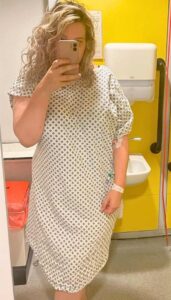
In 2022, I was on my third bout of tonsillitis, which wasn’t shifting after three rounds of antibiotics.
One evening, I found that I was struggling to walk, had a temperature of 39.8 degrees Celsius, felt very sick, and had the feeling that I was going to die because I felt so unwell.
Being a healthcare professional, I was aware of the signs and symptoms of Sepsis, but you never think it’s going to happen to you. One of my friends, who happens to be a junior doctor, took me to A&E after being told to go by 111, as she was concerned at my deterioration.
When I got into A&E, my blood pressure was 90/40 and dropping. When the hospital staff realized that I couldn’t stand unassisted, they allowed my friend to come into A&E and stay with me, which I’ll forever be grateful for. After urine and blood tests, Sepsis was confirmed, and I was put onto the Sepsis pathway and stayed in the hospital for a few nights. The whole thing is a blur really (after having a lot of morphine, I’m not surprised). 
I believe I was discharged too early as on discharge, I couldn’t eat or walk properly. However, I’ve come to accept that the NHS is overwhelmingly understaffed and underfunded, and early discharge is the reality for a lot of people.
I made the mistake of going back to work full-time in the NHS 2.5 weeks after I was discharged. A couple of months went by, and I realized that I was struggling with Post Sepsis Syndrome (PSS). My personal experience with PSS has been characterized by extreme fatigue and lethargy, limiting my ability to remain awake for more than four hours. I also experience poor concentration, confusion, swollen joints, and recurrent infections.
I struggled for a year with all of these things until I went to the GP as I couldn’t carry on. I was falling asleep whilst driving, having to sleep on my breaks, and struggling with aches and pains being on my feet all day. Luckily, my GP was aware of PSS and was able to sympathize and understand my struggles. After routine blood tests, we found that I have several deficiencies, including Folic Acid Anaemia and being anemic. My biggest surprise was that the hospital gave me no follow-up or information after my discharge about how I might feel or PSS. I also regret not listening to my body and allowing myself to become ill again before letting my body have time to recover.
I’m learning that I need to find a “new norm,” and I’m trying to come to terms with the fact that I may never be the same again. Sepsis affects everyone so differently, and we all need to find our own path and road to recovery.

